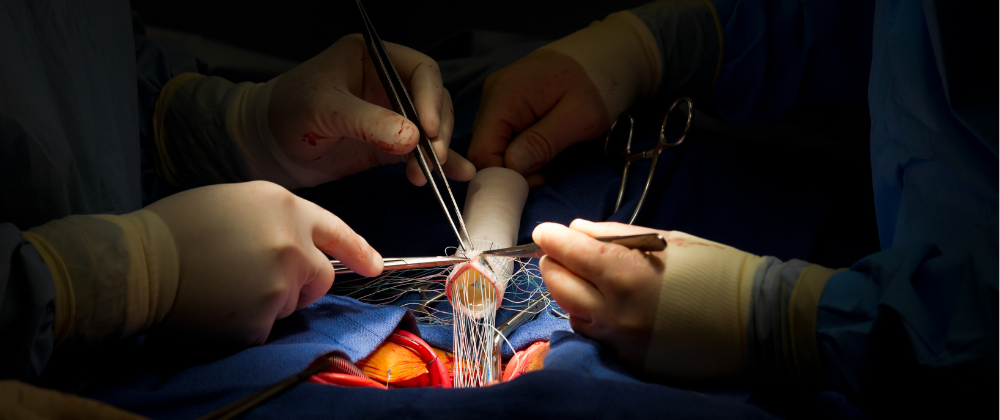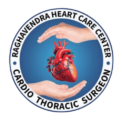Aortic Valve Replacement
Appointment Form

Dr. Raghavendra Murthy
MBBS, MS - General Surgery, MCh - Cardio Thoracic and Vascular Surgeron

Best Aortic Valve Replacement Surgery in Bangalore
Aortic Valve Replacement (AVR) is a crucial procedure for patients with aortic valve disease, improving heart function and enhancing quality of life. In Bangalore, specialized cardiac care is available, with Dr. Raghavendra Murthy, a renowned cardiac surgeon, offering expertise in heart valve replacement, open-heart surgery, and minimally invasive treatments. His personalized approach ensures that patients have access to the most appropriate treatment for their condition, providing the best outcomes for those seeking Aortic Valve Replacement Surgery in Bangalore.
AVR can restore normal heart function but carries risks, like any major surgery. Patients can expect detailed pre-operative assessments, followed by a well-managed recovery process. With Dr. Murthy’s care, the procedure aims to improve overall health and enable patients to lead a more active, fulfilling life. This article helps guide patients through the process, from understanding the risks and benefits to making informed decisions about their heart health.
What is Aortic Valve Replacement Surgery?
Aortic Valve Replacement (AVR) surgery is needed when the aortic valve in the heart becomes damaged or diseased, typically due to conditions like aortic stenosis (narrowing of the valve) or aortic regurgitation (leakage of the valve). These conditions can lead to reduced blood flow, causing symptoms such as shortness of breath, fatigue, chest pain, and heart failure. AVR involves replacing the faulty valve with either a biological valve (from animal tissue) or a mechanical valve (made from synthetic materials). The surgery restores normal heart function, alleviates symptoms, and significantly improves the patient’s quality of life. It is typically performed in cases where the valve damage is severe and cannot be managed with medication alone.
Common reasons for aortic valve replacement include:
- Aortic stenosis: Narrowing of the valve, which obstructs blood flow.
- Valve regurgitation: Leakage of blood backward into the heart.
- Congenital valve abnormalities: Birth defects that affect the valve’s structure.
The most common causes of aortic stenosis are aging and conditions such as heart valve disease and atherosclerosis. Additionally, some individuals are born with an abnormally shaped aortic valve, making them more susceptible to valve dysfunction over time.
Risks of Aortic Valve Replacement
While aortic valve replacement is generally safe and successful, it does carry certain risks. The surgical risks can vary based on the patient’s age, overall health, and the complexity of their heart condition. Here are some risks associated with aortic valve replacement:
- Infection: Infections, such as endocarditis, can sometimes occur, especially in patients with compromised immune systems.
- Bleeding: Bleeding can occur during or after surgery and may require additional medical intervention.
- Blood clots: Clots can form on mechanical valves, making it essential for patients with mechanical valves to take blood-thinning medication.
- Valve leakage: Leakage around the valve site may occasionally happen, which could require further intervention.
However, with the use of advanced technology and the expertise of cardiac surgeons like Dr. Raghavendra Murthy, the success rates for aortic valve replacement have significantly improved.
What You Can Expect from Aortic Valve Replacement in Bangalore
Before the Procedure
Before the aortic valve replacement procedure, patients undergo a detailed evaluation that includes imaging tests, blood tests, and possibly cardiac catheterization. This is to assess the overall health of the heart and determine the best heart valve replacement approach for the patient. Dr. Murthy and his team ensure that patients understand each step of the process and are prepared for the surgery. Patients may also need to stop certain medications or make specific lifestyle adjustments to prepare for surgery.
During the Procedure
Aortic valve replacement surgery can be done in two primary ways:
- Open-heart surgery: This traditional method involves making an incision in the chest to access the heart and replace the damaged aortic valve.
- Transcatheter Aortic Valve Replacement (TAVR): This minimally invasive option allows doctors to replace the aortic valve through a catheter, often inserted through the leg. TAVR is commonly used for high-risk patients who may not be able to undergo open-heart surgery.
The type of valve used can vary as well:
- Mechanical valves: Made of durable materials and often preferred for younger patients, though they require lifelong blood-thinner medications.
- Bioprosthetic (tissue) valves: Made from animal tissue and do not require blood thinners but may need to be replaced after 10–15 years.
Dr. Raghavendra Murthy discusses both options with patients, considering factors such as age, lifestyle, and overall health, to select the best approach for aortic valve replacement in Bangalore.
After the Procedure
Following aortic valve replacement, patients will stay in the hospital for a few days. During this period, the medical team monitors recovery closely, managing pain and ensuring heart function is stable. and his team provide comprehensive follow-up care, guiding patients through the heart surgery recovery process.
Once home, patients need to follow a tailored recovery plan that includes:
- Medications: Some patients, particularly those with mechanical valves, will require blood thinners to prevent clot formation.
- Cardiac rehabilitation: This involves a series of exercises and heart-healthy lifestyle changes to aid in recovery.
- Regular check-ups: To ensure the new valve is functioning correctly and to monitor for any potential complications.
Results and Recovery
The primary goal of aortic valve replacement is to restore normal blood flow, ease symptoms, and enhance overall quality of life. With the support of an experienced cardiac surgeon like Dr. Murthy, patients often experience significant improvements, including increased energy, better breathing, and a reduced risk of heart complications. Recovery time varies by patient but typically takes several weeks to months, with many people resuming daily activities as soon as they are cleared by their doctor.
Patients are encouraged to stay active, eat heart-healthy foods, and avoid smoking to maintain their newly restored heart health. Regular follow-ups are crucial for long-term success and health.
Alternatives to Valve Surgery
In some cases, aortic valve repair may be an option. This approach is less invasive than replacement and may be ideal for certain patients. Additionally, minimally invasive mitral valve repair is available for those who qualify, allowing patients to avoid the risks associated with full valve replacement. However, aortic valve replacement remains the preferred treatment for patients with severe aortic stenosis or valve damage.
Treatment Options for Aortic Valve Replacement Surgery
Aortic valve replacement surgery is a critical procedure for those with severe aortic valve disease, where the aortic valve doesn’t function properly due to conditions like aortic stenosis or regurgitation. Here’s an overview of the treatment options available, helping patients make informed decisions to restore heart health and improve quality of life.
Open-heart aortic valve replacement is the standard approach for aortic valve replacement and is highly effective. During this procedure, the surgeon removes the damaged valve and replaces it with either a mechanical or tissue valve. Open-heart surgery requires a larger incision in the chest and the use of a heart-lung machine.
In minimally invasive aortic valve replacement, the surgeon makes smaller incisions to reach the heart, often avoiding the need to fully open the chest. This approach reduces recovery time, pain, and risk of infection.
TAVR, also known as TAVI (Transcatheter Aortic Valve Implantation), is a less invasive alternative to open-heart surgery. It is performed using a catheter inserted through a small incision, often in the groin. The new valve is placed inside the damaged valve without removing it.
Mechanical valves are made from durable materials like titanium or carbon, offering a long-term solution for patients. These valves can last a lifetime but require patients to take blood-thinning medication (anticoagulants) indefinitely to prevent blood clots.
Biological valves, made from animal or human tissue, offer a more natural alternative that doesn’t require lifelong blood thinners. However, tissue valves may wear out over time, especially in younger patients, potentially requiring another replacement.
Aortic Valve Replacement Surgery in Bangalore provides life-changing opportunities for patients with aortic valve disorders. Guided by the expertise of Dr. Raghavendra Murthy, individuals can experience a tailored approach to heart health, supported by cutting-edge surgical techniques and compassionate care. With a focus on both safety and recovery, this treatment offers renewed hope for a healthier, active future.
Conclusion
Opting for Aortic Aneurysm Repair Surgery in Bangalore allows patients to benefit from the expertise of leading specialists like Dr. Raghavendra Murthy. With access to advanced medical technology, the city is well-equipped to enhance patient outcomes significantly. Renowned for its personalized approach, comprehensive diagnostics, and a variety of effective treatment options, Bangalore excels in providing personalised care for aortic aneurysm management. Dr. Raghavendra Murthy and his team prioritize innovative techniques and patient safety, ensuring that individuals receive the highest standard of care throughout their treatment journey, leading to improved recovery and quality of life.
Frequently Asked Questions
A cardiologist can evaluate your symptoms and perform tests like echocardiograms to assess valve function and determine if surgery is necessary.
TAVR is a minimally invasive procedure performed through a catheter, often suitable for high-risk patients, whereas open-heart surgery requires opening the chest.
Recovery involves a hospital stay, followed by several weeks of gradual healing. Patients are advised to avoid strenuous activities and follow a heart-healthy lifestyle.
Surgery usually takes 2-4 hours, depending on the complexity of the procedure and the patient’s condition.
Preparation includes undergoing pre-surgery tests, adjusting medications as per doctor’s instructions, and discussing recovery and post-operative care with your healthcare team.
In mild cases, medications may manage symptoms, but they cannot reverse valve damage. Surgery is the only definitive treatment for severe cases.
